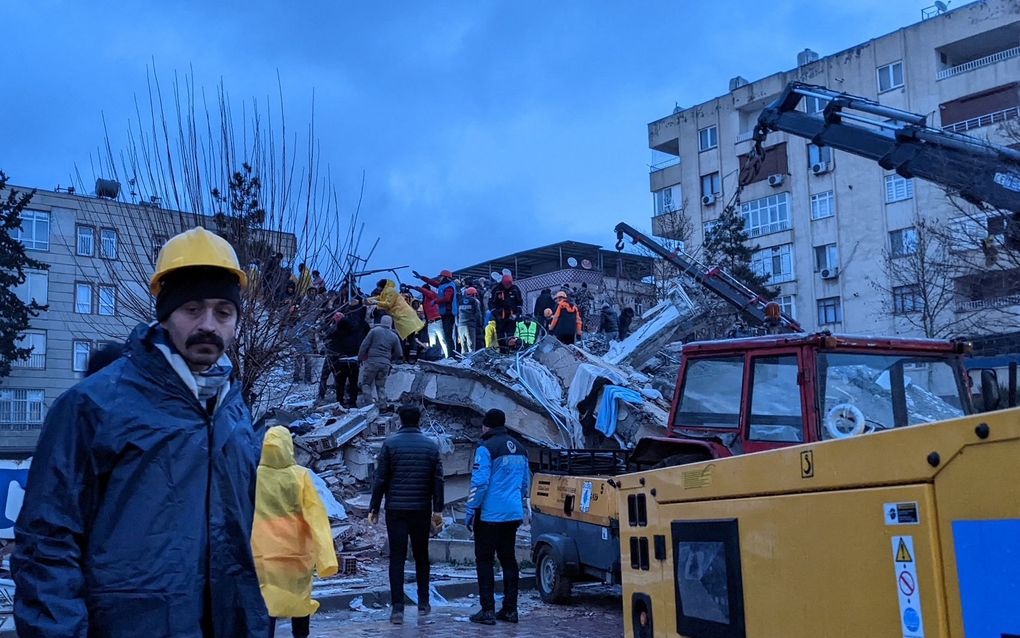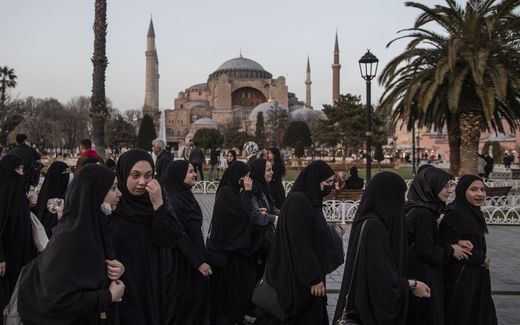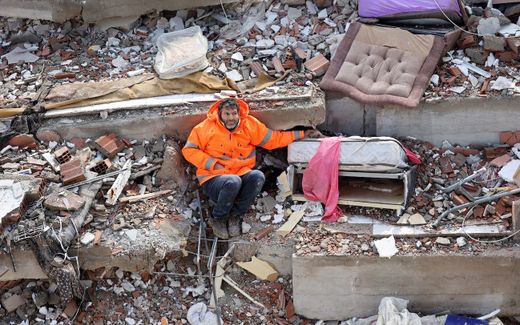Sanliurfa mourns but does not complain: In other cities, the situation is worse
11-02-2023
Southern Europe
Mark Wallet, RD

Rescue workers and volunteers search for survivors in the rubble of a collasped building, in Sanliurfa, Turkey. Photo AFP, Remi Banet
Southern Europe
Dust from the earthquake has settled in Sanliurfa, a town in southeastern Turkey. The dead have been recovered; the search has ceased. Displaced people do not want to complain because elsewhere, circumstances are worse.
A white upholstered chair with a brown leaf pattern balances among the debris. Next to it hangs a rug belonging to the upstairs neighbours. Above it, to the right, two concrete irons hold a mattress in the air. From a cord dangles an iron. In one fell swoop, the role of all these objects was played out Sunday to Monday night. The owners can only hope for the best.
The road in front of the collapsed building in the Turkish city of Sanliurfa has been closed off with ribbons by police. A little further on, the same scene is seen. The row of apartment buildings on a wide boulevard is suddenly interrupted by a large pile of rubble. Police officers ensure no one gets too close; the whole street is cordoned off. "It's still dangerous," one officer explains. People walk past on the other side, standing still for a moment, talking to each other in groups.
Sanliurfa still came out well compared to other cities in the earthquake zone. Although dozens of buildings have collapsed, the vast majority of the city has withstood the quakes. More or less, at least: here, some wall plates have sailed down, there, a hole has been punched in a wall. At a mosque, large chunks of stone lie on the steps to the entrance, and a hole in the roof gaps.
Local media write that the disaster has claimed the lives of 127 people in the region, while over 2,500 were injured. Sanliurfa province governor Salih Ayhan tweeted on Thursday about the funeral of six of the victims from one family. Haci Halik Bulut, Haci Islim Bulut, Haci Mehmet Bulut, Haci Zübeyde Bulut, Mehmet Sükrü Bulut, Islim Bulut.
1️⃣Bakanımız Sn. Nureddin Nebati ile Valimiz @valisalihayhan;
— T.C. ŞANLIURFA VALİLİĞİ (@UrfaValiligi) February 9, 2023
?Depremde hayatlarını kaybeden vatandaşlarımız
1.Hacı Halil Bulut
2.Hacı İslim Bulut
3.Hacı Mehmet Bulut
4.Hacı Zübeyde Bulut
5.Mehmet Şükrü Bulut
6.İslim Bulut için düzenlenen cenaze törenine katıldı. pic.twitter.com/yFHpSgGSR2
Baby
Displaced people are mostly glad they survived the disaster. Ahmed recounts how large cracks pulled into the walls of his flat block. The apartment remained standing, but the question is for how long. He and dozens of others are now staying in a conference room at the Hilton Garden Inn Hotel in the city.
"In other cities, it is much worse," he puts his situation into perspective. Around him, people sit on rugs, their backs leaning against the wall. Next to them are plastic bags with hastily gathered items. Children run around.

Most of Sanliurfa's displaced people have found shelter in white tents erected in many open spaces in the city. Whether it is not cold there with the night frost? "Come," gestures a man in one of the tent camps, holding the tent canvas open invitingly. Inside, he points to a stove, of which the pipe sticks out through the tent canvas.
Two of the man's daughters look curiously at the guest. In the makeshift shelter, his wife bends over a baby in a travel cot. With speaking gestures, the Turk makes clear what the earthquake caused to their home: destruction.
Yet most people seem mostly grateful that nothing worse happened to them. "We survived," says someone further down the camp, tying his tent tighter to a fence. "In other places, it's much worse."
This article was translated by CNE.news and previously published in Dutch daily Reformatorisch Dagblad on February 10th, 2023.
Related Articles





